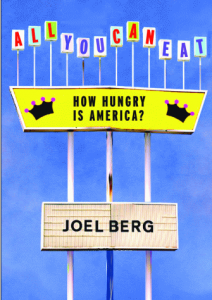“Besides the best cream sauces, we hope they can opine on hunger in America.”
That was essentially the message Joel Berg, executive director of New York Coalition Against Hunger, hopes CIA students got when he visited them last summer in Hyde Park, New York. Meandering my way down roadways with names like Parsley, Thyme, and Oregano, I finally found parking and squeezed into the crowded lecture hall to hear Berg speak. I was intrigued that a man who has made it his mission to eradicate hunger in America was talking to students at one of the most prestigious culinary schools in the world.
Joel Berg loves food. He loves America. He loves the government (when it’s working right). He hates hunger.
The baffling fact of the matter is, that in this country more than 35 million people live with hunger—12. 6 million of them are children. “Hunger amidst a sea of plenty is a phenomenon as American as baseball, jazz, and apple pie,” says Berg in his book, All You Can Eat: How Hungry is America? (Seven Stories Press)
His challenge to chefs and food lovers is to remember that food is not just a profession or pastime—it’s also a progressive issue. “In the 60s, people remembered the Depression or they were the sons and daughters of children of the Depression,” Berg says. “Now the elites of our society are incredibly removed from poverty. So many are clueless about the issue of hunger, poverty, and the most effective ways to end it.”
Think about whether to use swiss chard or ramps, he says, but also think about how the poor can afford it—or even find a way to get to a store that carries it.
Berg’s solution to end hunger is simple: Let the government use its clout, reach, and resources to feed the greatest number of people. He points to programs in the past, particularly in the 1960s and 1970s, that were extremely successful in reducing the number of hungry. These programs, envisioned during the Kennedy Administration and enacted by Congress during the Nixon Administration, included The Food Stamp Program, Free and Reduced Price School Lunches, and Women, Infants & Children (WIC).
“Margaret Mead once said, ‘Never doubt that a small group of thoughtful, committed citizens can change the world,’ ” Berg says. “I think that’s elitist. One person can be very influential, but you need a mass movement.”
A bill currently running through the House allocates $450 million annually to children’s nutrition (the Senate asked for $900 million and the President wanted $1 billion), but according to Berg it really needs to be $4 billion.
“Somehow they found $1.5 billion for crop disaster payments,” Berg says. “What angers me is that we provide resources for corporate welfare, we don’t restore previous rates of taxation on billionaires, and yet we allow hunger to continue. Now, we have a president in the White House who once lived on food stamps as a child. He believes in it. So we still have hope.”

Erika,
Good balance between articles of cultural interest and those about social concerns. Well done.